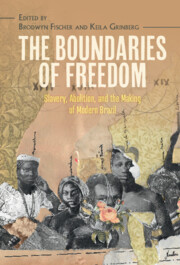Book contents
- The Boundaries of Freedom
- Afro-Latin America
- The Boundaries of Freedom
- Copyright page
- Contents
- Figures
- Tables
- Acknowledgments
- Introduction Slavery and Freedom in Nineteenth-Century Brazil
- Part I Law, Precarity, and Affective Economies during Brazil’s Slave Empire
- Part II Bounded Emancipations
- Part III Racial Silence and Black Intellectual Subjectivities
- 9 Breaking the Silence
- 10 The Life and Times of a Free Black Man in Brazil’s Era of Abolition
- 11 Political Dissonance in the Name of Freedom
- 12 “The East River Reminds Me of the Paraná”
- Part IV Afterlives of Slavery, Afterwards of Abolition
- Bibliography
- Index
10 - The Life and Times of a Free Black Man in Brazil’s Era of Abolition
Teodoro Sampaio, 1855–1937
from Part III - Racial Silence and Black Intellectual Subjectivities
- The Boundaries of Freedom
- Afro-Latin America
- The Boundaries of Freedom
- Copyright page
- Contents
- Figures
- Tables
- Acknowledgments
- Introduction Slavery and Freedom in Nineteenth-Century Brazil
- Part I Law, Precarity, and Affective Economies during Brazil’s Slave Empire
- Part II Bounded Emancipations
- Part III Racial Silence and Black Intellectual Subjectivities
- 9 Breaking the Silence
- 10 The Life and Times of a Free Black Man in Brazil’s Era of Abolition
- 11 Political Dissonance in the Name of Freedom
- 12 “The East River Reminds Me of the Paraná”
- Part IV Afterlives of Slavery, Afterwards of Abolition
- Bibliography
- Index
Summary
Focusing on the life trajectory of Brazilian engineer Teodoro Sampaio, this chapter discusses the possibilities for social transformation available to men of color during and after Brazilian abolition. Sampaio lived through a time when the dismantling of slavery coincided with a racialization of social status, justified by the postulates of scientific racism. His trajectory thus illuminates how an educated son of a freed mother could make his way through a society that was reinventing socio-racial hierarchies even as slavery lost its legitimacy. This chapter aims to elucidate the intricate network of relationships and endeavors engendered by a pardo, born on a large slave property, who managed to become an engineer and manumit his three brothers, who were enslaved on the same plantation where Sampaio himself was raised free. Based on Sampaio’s autobiographical texts, books, articles, and private correspondence – as well as on what his contemporaries wrote about him – this chapter will reflect on what we can learn from Teodoro Sampaio’s life about what it meant to be a free, lettered pardo man during the dismantling of Brazilian slavery.
- Type
- Chapter
- Information
- The Boundaries of FreedomSlavery, Abolition, and the Making of Modern Brazil, pp. 264 - 286Publisher: Cambridge University PressPrint publication year: 2022
- 1
- Cited by

